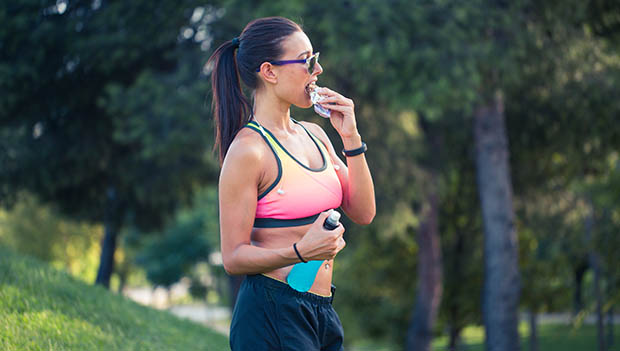
Nothing ruins a run faster than low energy or worse, a bathroom emergency. Whether you're just starting to dabble in racing and mileage increases or you've been running for decades, zeroing in on your fueling can be a great way to get faster and feel better on the run. Instead of heading out with an empty tank, peruse this fueling guide to tackle the low hanging performance fruit. Your running stats (and mood!) will thank you.
Pre-Run
If your run is 2+ hours away, go for a small- to medium-sized meal. If you have less than 2 hours until go-time, consider a snack to avoid stomach issues. In general, you want to aim for something with plenty of carbohydrates and a little bit of protein. Registered dietitian Kelly Hogan, MS, RD says, "If you don't have a lot of time before a run, having something easily digestible with 15 to 30 grams of carb can work. Examples could be toast with jam or a banana with peanut butter."
During the Run
If you'll be out for less than an hour, you likely just need some water or maybe an electrolyte drink such as Nuun.
For runs longer than 60 minutes, Hogan suggests taking in 30 to 90 grams of carbs per hour depending on duration of the run and effort. She says, "For runs longer than 2.5 hours or very hard efforts, I'd recommend aiming for 90 grams of carb per hour. I don't typically give calorie recommendations here."
Practically, that might look something like the following: For runs of 60 to 90 minutes, consider taking a gel (GU energy gels are a runner fave) or some chews at the 30- or 45-minute mark. Gels usually contain around 25 grams of carbohydrate, so one or two per hour should be sufficient. If you'd prefer to drink your carbs, something like Gnarly Fuel2O could be a good option.
If you're headed out for a long effort (2 hours, for example), that might mean taking gels every 30 minutes along with some carbohydrate drink. Two gels (50g total) and a packet of Maurten 160 (40g) would get you to Hogan's recommended 90g/hour.
A good rule of thumb is to also consume at least 16oz of fluid per hour, depending on weather and sweat rate.
Post-Run
After a run, Hogan says you'll want to have at least 15 to 20 grams of protein within 30 to 60 minutes of finishing to help support muscle protein synthesis. She adds, "You'll want to continue to consume protein sources (and carbs!) throughout the day." A glass of chocolate milk or a smoothie can be an easy way to get in some calories and protein even if your appetite is diminished. Both whey protein and vegan protein work similarly, so choose what fits best with your dietary preferences. Some options, such as Gnarly Fuel whey protein, even contain a special digestive enzyme to help with absorption and avoid stomach upset.
Troubleshooting
Fueling before, during and after runs can take a bit of practice, so it's important to test out your strategy on training runs. If you find yourself making frequent pit stops, try limiting excess fiber and fat in the hours (or even day) before you tackle an important run.
If muscle cramps and nausea get you down, you might need to consume more electrolytes, especially sodium. The hydration mix LMNT has a lot more sodium (~1,000 mg per serving) than other options, so it's a great choice for very hot efforts.
If you can't stomach the taste or texture of gels and chews, you can try experimenting with whole foods like dried fruit, honey packs or gummy bears. Everyone's body works a little differently, so keep practicing until you find the strategy that works best!


